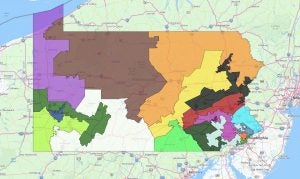Toomey rails against Pa. redistricting, calls for conversation on impeaching justices
“The Pennsylvania Supreme Court has engaged in a really amazing, highly partisan, unconstitutional power grab,” he told reporters in the Capitol rotunda.

U.S. Senator Pat Toomey, seen here in August 2017. (AP Photo, file)
In a rare visit to Harrisburg, Republican U.S. Senator Pat Toomey made clear his strong opposition to the Pennsylvania Supreme Court’s decision to redraw the state’s congressional maps.
Toomey threw his support squarely behind state Republicans seeking to get the decision stayed in federal court, and took up the arguments state House and Senate leaders have been making for several weeks.
“The Pennsylvania Supreme Court has engaged in a really amazing, highly partisan, unconstitutional power grab,” he told reporters in the Capitol rotunda.
The court, he said, has no right to arbitrate congressional map-drawing under the U.S. Constitution—no matter what the maps look like.
“Now, let me be clear,” he said. “The current map, the legal map, has gerrymandered seats. But it was constitutionally drawn, constitutionally adopted.”
Toomey also lent some legitimacy to a Republican-sponsored petition that has been circulating the state Capitol to impeach the four Democratic state justices who took part in redrawing the map.
So far, it hasn’t gotten much acknowledgement from GOP leaders.
But Toomey told reporters he thinks that “state House members, state senators are going to be speaking amongst themselves and their constituents, and the fundamental question is: does this blatant, unconstitutional, partisan power grab that undermines our electoral process—does that rise to the level of impeachment?”
“That’s ultimately their decision,” he said. “But it’s a conversation that has to happen.”
For now, House and Senate Republican leaders appear to be keeping their attention on appealing to the U.S. Supreme Court for a stay on the state court decision. Their specific argument is that State Supreme Court cannot invalidate congressional maps.
House Speaker Mike Turzai noted, when two similar cases were brought to federal courts, the courts held that Pennsylvania’s congressional maps were constitutional.
Because congressional maps are federal maps — albeit, ones drawn by state representatives—Turzai is saying the matter should remain in federal court.
“There is no explicit language in the state constitution dealing with the drawing of congressional lines — that’s in the federal constitution,” he said. “We do not believe that the state Supreme Court had the power, based on the state constitution to invalidate the congressional map.”
Steve Miskin, spokesman for House Republicans, tweeted the opposite of his boss’ rationale Wednesday morning.
Nobody questions @PASupremeCt authority to declare a map unconstitutional, but their “remedy” violates the Constitution by drawing their own replacement map. That power is only granted to the states through the enactment of legislation by the General Assembly and the Governor. pic.twitter.com/JE6MeHGGeX
— Stephen A. Miskin (@Sam1963) February 21, 2018
State Democrats and a number of Republicans have also differed with the case that Turzai and Senate President Pro Tempore Joe Scarnati are making.
Senate GOP Leader Jake Corman, for instance, had opposed the short timeline the justices imposed for the legislature to redraw the map, and supported lobbying the state court for an extension so that lawmakers could work together to compromise on a new one.
He didn’t question the court’s right to rule the old map unconstitutional.
“We could have had a bipartisan approach,” he said last week. “The Republican leaders of both the House and Senate, and the governor standing here with you to lay out this process, which I think would have given confidence to the people of Pennsylvania that this was being done in a fair way.”
In their decision, the court’s Democratic justices argued they can invalidate congressional maps under Article I, Section 5 of the state constitution.
It states, “elections shall be free and equal; and no power, civil or military, shall at any time interfere to prevent the free exercise of the right of suffrage.”
Partisan gerrymandering, the majority opinion said, “dilutes the votes of those who in prior elections voted for the party not in power to give the party in power a lasting electoral advantage…It is axiomatic that a diluted vote is not an equal vote, as all voters do not have an equal opportunity to translate their votes into representation.”
The justices noted that the state Supreme Court has never before ruled that a redistricting plan violates the Free and Equal Elections Clause. But they concluded that “we have never precluded such a claim in our jurisprudence.”
WHYY is your source for fact-based, in-depth journalism and information. As a nonprofit organization, we rely on financial support from readers like you. Please give today.







